#hamilcar
Explore tagged Tumblr posts
Text
So I rewatched all the Hammer and Bolter episodes and im just loving Hamilcar soo much. Should I get some of his books? Are they good? Is he just as unhinged?
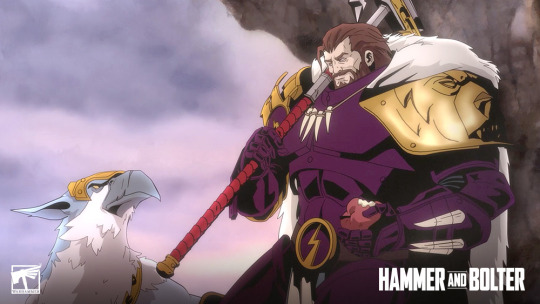


31 notes
·
View notes
Text
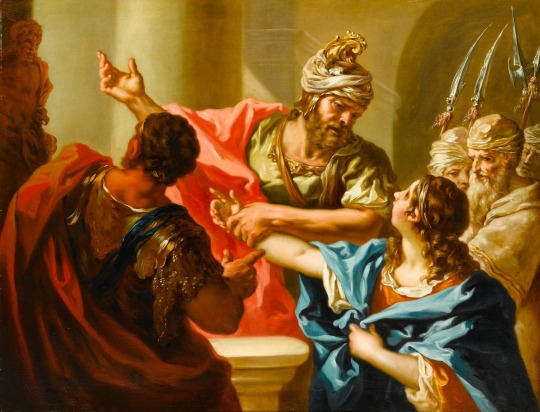
Young Hannibal Swears Enmity to Rome
by Giovanni Antonio Pellegrini
‘When I come to age, I shall pursue the Romans with fire and sword and enact again the doom of Troy. The gods shall not stop my career, nor the treaty that bars the sword, neither the lofty Alps nor the Tarpeian rock. I swear to this purpose by the divinity of our native god of war, and by the shade of Elissa.’
- Silius Italicus, Punica, Book I, 114-119
#hannibal barca#hamilcar barca#art#giovanni antonio pellegrini#history#carthage#iberia#sacred#oath#vow#hannibal#hamilcar#antiquity#rome#ancient rome#enemy#punic wars#roman#romans#carthaginian#carthaginians#first punic war#second punic war#iberian peninsula#ancient#mediterranean
82 notes
·
View notes
Text
La Troisième Guerre mondiale pourrait-elle commencer à Taïwan ?
Le plan politique du président chinois Xi Jinping est de faire de son pays la première puissance mondiale en 2049 afin de commémorer le centenaire de la victoire de Mao Tsé-toung sur Tchang Kaï-check. Par Hamilcar Continue reading Untitled
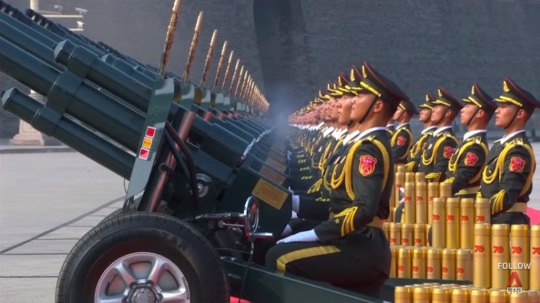
View On WordPress
#boulevard voltaire#Chine#commencer#Hamilcar#Observatoire du MENSONGE#Taïwan#troisième guerre mondiale
0 notes
Text

I started BG3 during April and have now sunk far too much of my time into it. This is my dearest, darling Tav, a goody-two-shoes self-identified paladin who tries her very best, to mixed results. I will talk about her to anyone who listens.
#baldur's gate 3#bg3#bg3 tav#original charater art#baldur's gate 3 art#tav bg3#yes she is named after hasdrubal son of hamilcar barca carthaginian general#in my head her patron is xartaza. exu calamity you will always be famous#i might draw her and minthara when i have time because i am beset by visions of them.
17 notes
·
View notes
Text
I can't believe the Carthaginians attacked tumblr's ceo
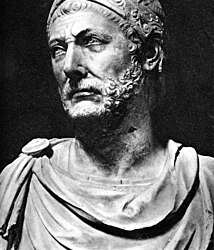
#haha get it? Hamilcar? I swear im funny#this is the only thing I got out of my History of the Mediterranean class
11 notes
·
View notes
Text
Impactul Tratatului de la Lutatius asupra Ambițiilor și Viitorului Cartaginei
Introducere Încheiat în 241 î.Hr., Tratatul de la Lutatius a marcat sfârșitul Primului Război Punic, primul conflict major dintre Roma și Cartagina pentru supremația în Mediterana. Deși tratatul a pus capăt războiului, termenii impuși de Roma au avut efecte profunde asupra viitorului Cartaginei, obligând-o să se confrunte cu pierderi economice, teritoriale și militare semnificative. Totuși,…
#alianțe iberice Cartagina#ascensiunea lui Hannibal#Cartagina și Roma#dorință de răzbunare Cartagina#efectele economice ale Tratatului de la Lutatius#Hamilcar Barca#impact economic cartagina#pierderi teritoriale Cartagina#Primul Război Punic#redirecționarea Cartaginei către Spania#Spania resurse Cartagina#termenii Tratatului de la Lutatius#Tratatul de la Lutatius
1 note
·
View note
Text
oh cycle of father making son swear vengeance we're really in it now. and by in it i mean. well. haha.
#sophies ramblings#hamilcar+hannibal - jean d'aubigne+agrippa d'aubigne - agrippa d'aubigne+poem/us :)#see Langer Ulrich. 'D'aubigne et hannibal au debut des miseres' in Reforme Humanisme Renaissance 1979 pp47-51
0 notes
Photo

Carthaginian Army
The armies of Carthage permitted the city to forge the most powerful empire in the western Mediterranean from the 6th to 3rd centuries BCE. Although by tradition a seafaring nation with a powerful navy, Carthage, by necessity, had to employ a land army to further their territorial claims and match their enemies. Adopting the weapons and tactics of the Hellenistic kingdoms, Carthage similarly employed mercenary armies from their allies and subject city-states. Military successes came in Africa, Sicily, Spain, and Italy, where armies were led by such celebrated commanders as Hamilcar Barca and Hannibal. Carthage's military dominance was, though, eventually challenged and bested by the rise of Rome and, following defeat in the Second Punic War (218-201 BCE), Carthage's days as a regional powerhouse were over.
The Carthaginian Empire
Carthage was founded in the 9th century BCE by settlers from the Phoenician city of Tyre, but within a century the city would go on to found colonies of its own. An empire was created which covered North Africa, the Iberian Peninsula, Sicily, and other islands of the Mediterranean. The new territory would be a source of vast wealth and manpower. Conversely, this would also bring Carthage into direct competition not only with local tribes but also contemporary powers, notably the Greek potentates and later Rome. In turn, this created a necessity for large military forces, especially land armies.
Continue reading...
167 notes
·
View notes
Text

An M22 light tank, also known as a Locust, squeezed inside a British Hamilcar glider.
24 notes
·
View notes
Text
Do you guys think Hamilcar Barca and Hanno ever explored each others bodies
#can old man yaoi bloom even during a violent rebellion#as you two actively fuck up the efforts against the rebellion cuz of ur personal and political rivalry#mags babs
10 notes
·
View notes
Photo
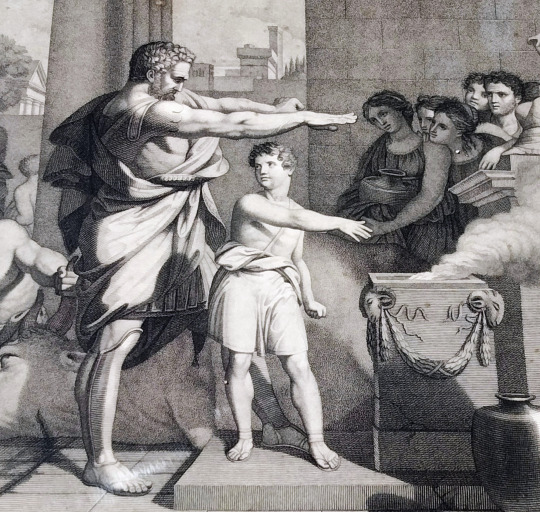
Hamilcar Barca Makes his Son Hannibal Swear Eternal Hatred of the Romans. 19th.century. Alessandro Contardi Italian 1795-1822. engraving. http://hadrian6.tumblr.com
121 notes
·
View notes
Text
We need Hasdubral the fair and Hamilcar Barca yaoi. We literally got Stacy's dad in the second punic wars
26 notes
·
View notes
Note
If you’re down to answer another question like the music one, what are the characters’ favorite in-universe cuisines/culinary preferences? Or, are there any fun reasons why some characters like/dislike certain things as we see in the glossary?
Off the top of my head:
Utsu dislikes fish because it's ubiquitous in Itan cuisine and had a lot of it served to her poorly-prepared as a kid. I think it comes up in the text at some point, but her favorite food is layered pasta dishes like lasagna. (I know what you're thinking, and no, I didn't do it on purpose.)
Kam is a vegan, but obviously only for health reasons since they don't slaughter animals for meat in the setting. She likes very spicy food like chilis and curry - her favorite is stuffed jalapenos. She also likes crepes.
Ran also kinda likes spicy food, but isn't super passionate about cuisine and mostly just goes for low-effort stuff. She eats a lot of stir fry and dumplings.
Theo also worries about his longer-term health which is why he's on a low-carb diet, but renders this pointless by eating tons of chocolate and sweets all the time. He likes hot fudge cakes the best.
Ptolema just really likes meat. Her favorite is just a really well-seasoned blue steak, probably with blue cheese, and she also probably really enjoys whatever the equivalent of brazilian barbecue is.
I don't think I ever decided what foods Seth likes best except that he eats a lot of junk food. I do remember deciding at some point that he really likes almonds despite being allergic to them.
Ophelia is a pescetarian for cultural reasons. Beyond that, she loves trying all sorts of foods, though shellfish and mushrooms are her favorite ingredients.
Lilith is a hyper-picky eater and doesn't like most vegetables or anything too complicated or mixed together. She probably most enjoys very simple things like chicken nuggets, and only takes small bites so she isn't overwhelmed.
As comes up in the story, Bardiya is a recovering alcoholic, which is the reason for his preference note. I think I put somewhere that kebabs are his favorite food.
Ezekiel dislikes onions because of their slimy and crunchy texture. He likes really straightforward food like Sunday roasts, which in-setting would mean he prefers Rhunbardic cuisine, though he'd never admit it.
Fang will eat anything under the sun, but also doesn't care that much about food in the grand scheme of things. Left to their own devices, they will cook everything into some kind of omelette and think it's great.
Linos doesn't like shellfish because, like Su, he ate a lot of it prepared badly when he was young. He enjoys participating in prestige/fine dining, especially for Ysaran and Viraaki food, more for the sense of being part of a cultural moment than the actual flavor.
Neferuaten likes foods like beyaynetu (or, like, pizza) designed specifically to be eaten communally. On her own she mostly just eats salad, though she has extremely specific opinions about wine and whiskey.
Durvasa likes to grow and preserve his own food, and his favorite is dal soup. He also has extremely specific opinions, though only about whiskey. He doesn't like red meat because he dislikes the idea that he's eating the flesh of a one-living being, even if it's replicated.
Zeno technically does not have a diet, and is sustained nutritionally by other means. He enjoys the taste of very indulgent foods like foie gras and controversial food like cultured human meat. He thinks Viraaki food is 'stinky' and 'greasy'.
Hamilcar does not eat except with company, which is why his entry says N/A. He can't taste food in the way he could when he was young, and he finds it upsetting.
Anna enjoys sushi, but is too old to eat much at all.
Mehit theoretically likes the kind of high-concept Saoic cuisine described by Ran early in the story, but is not a very good cook, so mostly eats things like baked potatoes and fried rice. This is partly why Lilith is the way she is, but only like, 20%.
Balthazar skips breakfast because otherwise he ends up overeating, since he's the type who can just keep going long beyond what's healthy. He's the sort of person who enjoys bizarre high-calorie flavors like fried squid dipped in ice cream.
26 notes
·
View notes
Text

#80 years ago
1944, June 6.
10:00 AM.
British Hamilcar gliders of the 6th Airborne Division about Normandy.
7 notes
·
View notes
Text
The Hamilcar book hard confirming that Sigmar and Hamilcar are two separate people rather than Sigmar throwing on a disguise was done in the funniest way possible.
Sigmar really did get clocked in the face before going "Stay humble, kid" back.
#age of sigmar#Warhammer#i'm gonna need to find someone to draw this#sigmar really is the kind of dad to let you win round one before chuckling and cracking his knuckles & proceeding to ruin mario kart for yo
8 notes
·
View notes
